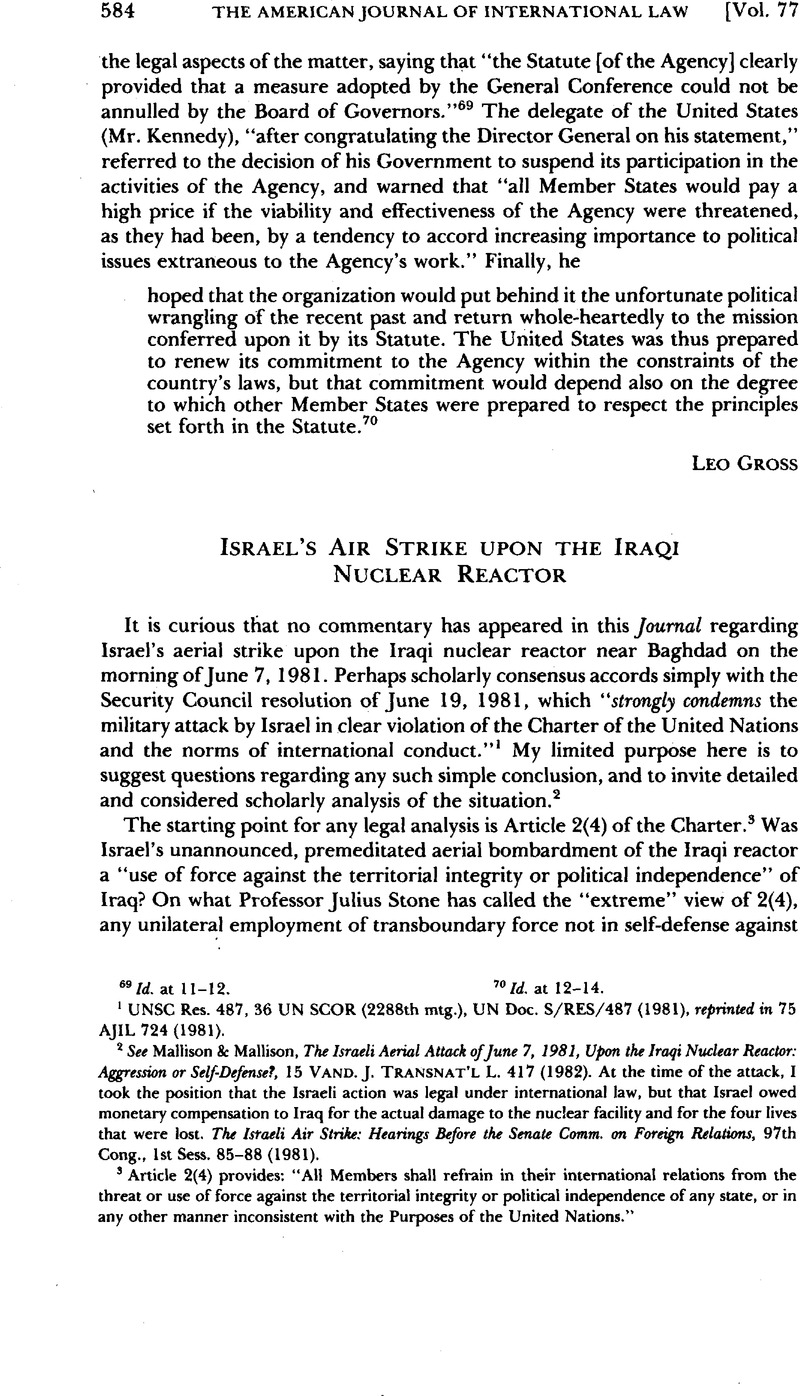Article contents
Israel’s Air Strike Upon the Iraqi Nuclear Reactor
Published online by Cambridge University Press: 27 February 2017
Abstract

- Type
- Editorial Comments
- Information
- Copyright
- Copyright © American Society of International Law 1983
References
1 UNSC Res. 487, 36 UN SCOR (2288th mtg.), UN Doc. S/RES/487 (1981), reprinted in 75 AJIL 724 (1981).
2 See Mallison, & Mallison, , The Israeli Aerial Attack of June 7, 1981, Upon the Iraqi Nuclear Reactor: Aggression or Self-Defense?, 15 Vand. J. Transnat’l L. 417 (1982)Google Scholar. At the time of the attack, I took the position that the Israeli action was legal under international law, but that Israel owed monetary compensation to Iraq for the actual damage to the nuclear facility and for the four lives that were lost. The Israeli Air Strike: Hearings Before the Senate Comm. on Foreign Relations, 97th Cong., 1st Sess. 85–88 (1981).
3 Article 2(4) provides: “All Members shall refrain in their international relations from the threat or use of force against the territorial integrity or political independence of any state, or in any other manner inconsistent with the Purposes of the United Nations.”
4 Stone, J., Aggression And World Order 95 (1958)Google Scholar.
5 Id. at 97–100. See, e.g., Franck, , Who Killed Article 2(4)?, 64 AJIL 809 (1970)Google Scholar; Henkin, , The Reports of the Death of Article 2(4) Are Greatly Exaggerated, 65 AJIL 544 (1971)CrossRefGoogle Scholar.
6 See Boyle, , International Law in Time of Crisis: From the Entebbe Raid to the Hostages Convention, 75 Nw. L. Rev. 769 (1980)Google Scholar.
7 See, e.g., Lillich, , Humanitarian Intervention: A Reply to Ian Brownlie and a Plea for Constructive Alternatives, in Law and Civil War in The Modern World 229 (Moore, ed. 1974)Google Scholar. Contra, Brownlie, Humanitarian Intervention, in id. at 217.
8 Mcdougal, M. & Feliciano, F., Law and Minimum World Public Order 222 (1961)Google Scholar.
9 Ibid.
10 Id. at 223.
11 Id. at 224.
12 Supra note 1. The lack of imposition of a sanction, penalty, or reprisal of any kind, whether from the United Nations or any individual nation, tends to support a claim that the act complained of was in fact legal. See D’Amato, , The Concept of Human Rights in International Law, 82 Colum. L. Rev. 1110, 1118–22 (1982)Google Scholar; Reisman, , Sanctions and Enforcement, in The Future of the International Legal Order 273 (Black, & Falk, eds. 1971)Google Scholar.
15 Mallison & Mallison, supra note 2, at 426 (quoting Washington Post, June 9, 1981, at A11 , col. 1).
14 See Falk, , Some Thoughts on the Decline of International Law and Future Prospects, 9 Hofstra L. Rev. 399 (1981)Google Scholar.
15 Treaty on the Non-Proliferation of Nuclear Weapons, 21 UST 483, TIAS No. 6839, 729 UNTS 161 (July 1, 1968), reprinted in 7 ILM 811 (1968).
16 Mallison & Mallison, supra note 2, at 440–41. The Mallisons argue that by joining the NPT and opening its own nuclear installations to IAEA inspection, Israel would gain leverage over the adequacy of IAEA supervision: “It would have at least been difficult, and probably impossible, for Iraq to refuse additional international inspection had Israel agreed to the same inspection for itself.” Id. at 428. How can it be “impossible” for a nation to refuse something?
17 See id. at 435–37.
18 The argument that there is an inherent right of self-defense apart from the limitation (“if an armed attack occurs”) of Article 51 is, according to Professor Henkin, “unfounded, its reasoning is fallacious, its doctrine pernicious.” Henkin, L., How Nations Behave 141 (2d ed. 1979)Google Scholar.
19 The Mallisons, supra note 2 at 423–24, do not convincingly distinguish the Cuban missile crisis from the Israeli aerial strike of 1981. Previously, Professor Mallison had written that the American position in 1962 was justified as self-defense under Article 51. See Mallison, , Limited Naval Blockade or Quarantine Interdiction: National or Collective Defense Claims Valid Under International Law, 31 Geo. Wash. L. Rev. 335 (1962)Google Scholar. President Kennedy himself carefully refrained from invoking Article 51 in support of the American quarantine, but he did use the language “in support of our own security “in his address of Oct. 22, 1962, 47 Dep’t State Bull. 716 (1962), and “to defend the security of the United States” in his Proclamation No. 3504 of Oct. 23, 1962, id. at 717, 27 Fed. Reg. 10,401 (1962). See also Wright, , The Cuban Quarantine, 57 AJIL 546, 560 n.53 (1963)Google Scholar; MacChesney, , The Quarantine Against Cuba: Legal or Illegal’, id. at 588, 589–90 Google Scholar.
20 See Henkin, , The United Nations and Its Supporters: A Self-Examination, 78 Pol. Sci. Q. 504, 532–33 (1963)Google Scholar.
- 12
- Cited by




